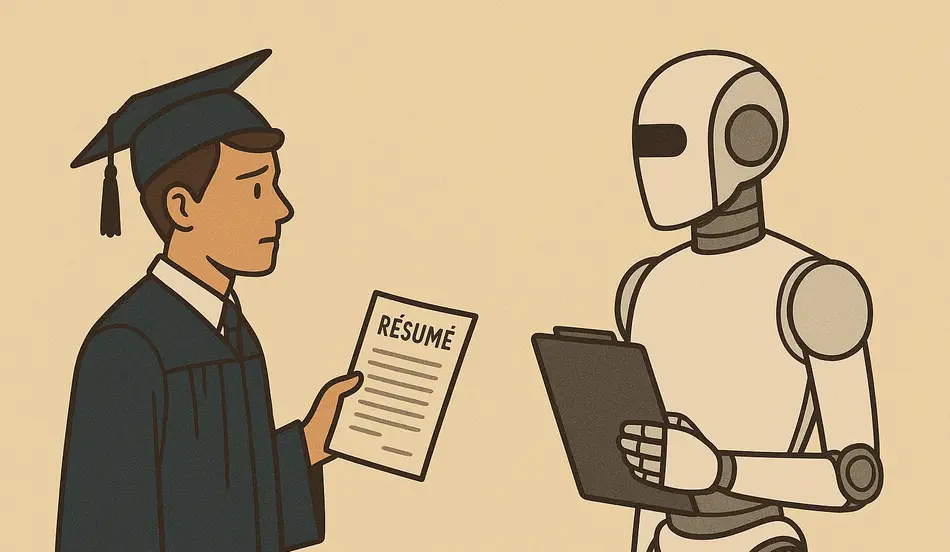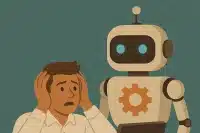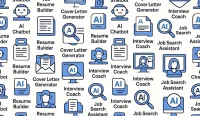The AI Job Disruption Reality for Recent Graduates
As we begin this Labor Day weekend, a pressing workplace topic weighs heavily on the minds of millions of Americans: artificial intelligence and its impact on jobs. Programs like ChatGPT can now handle tasks that once required human workers – writing memos, summarizing legal documents, creating designs, and more. But what happens to the people who used to do those jobs?
The reality is particularly harsh for recent graduates and entry-level workers, who are finding themselves increasingly displaced by AI automation. Olivia Fair, who graduated four years ago, represents a growing demographic of young professionals struggling to find stable employment in an AI-disrupted job market.
Fair’s experience illustrates the harsh new reality facing young job seekers. “I’ve applied to probably over a hundred jobs in the past six months,” she says. “And yeah, none of them are landing.” Her story reflects a broader trend where entry-level positions are disappearing as companies replace human workers with AI systems.
One of Fair’s previous jobs was in TV production, transcribing interviews. “But now they don’t have a bunch of people transcribing,” she explains. “They have maybe one person overseeing all of that and AI doing the rest, which I think is true for a lot of entry-level positions.” This pattern is becoming increasingly common across industries, where AI handles routine tasks while a single human supervisor manages the process.
The Numbers Behind the AI Job Disruption
The statistics paint a concerning picture for young job seekers. Job postings have declined year-over-year by 6.7%, with recent graduates facing particularly difficult challenges in finding employment. Laura Olrich, director of economic research at Indeed, confirms that the decline in jobs for recent grads correlates with the rise of AI.
However, the relationship between AI and job losses may be more nuanced than headlines suggest. “I think there is a cause and effect, but it’s maybe not as significant as a lot of people would think,” Olrich explains. In tech jobs specifically, postings are down 36% compared to pre-pandemic numbers, but this decline began before AI became commonly used.
The Real Culprits Behind Job Market Challenges
If AI isn’t solely responsible for the job market’s struggles, what is? The answer lies in a combination of factors that have created a perfect storm for young job seekers. The post-pandemic hiring boom of 2021-2022 led many companies to overhire, creating an unsustainable employment bubble that has since burst.
“Quite frankly, I think some companies overhired,” Olrich notes. The uncertain national economic situation, including tariffs, taxes, and foreign policy concerns, has also contributed to hiring slowdowns. “Some other people have used the analogy of like driving through fog,” she explains. “If it’s foggy, you slow down a bit, but if it’s really foggy, you pull over. And unfortunately, some companies have pulled over to sit and wait to see what is going to happen.”
The AI Job Disruption: Separating Hype from Reality
Despite the dramatic headlines suggesting AI is coming for all our jobs, the reality is more complex. David Autor, a labor economist at MIT, offers a balanced perspective: “There’s great potential and great risk. I think that it’s not nearly as imminent on either direction as most people think.”
The real concern, according to Autor, is that AI may be “relieving the newcomers, the beginning incoming novices” from gaining essential experience. “This is really a concern about judgment expertise,” he explains. “It’s acquired through immersion, right? You know, how do I care for this patient or land this plane or remodel this building? And it’s possible that we could strip out so much of the supporting work that people never get the expertise.”
Which Jobs Are Most at Risk from AI Disruption?
Research has analyzed 2,800 specific skills, finding that 30% could be at least partially automated by AI. This means 70% of job skills remain safe from AI disruption in its current form. The jobs most vulnerable to AI replacement are those involving “sitting in front of a screen”:
High-risk positions include software coding, accounting, copywriting, translation, customer service, paralegal work, illustration, graphic design, songwriting, and information management. These roles often involve repetitive tasks that AI can perform more efficiently than humans.
However, AI will have a much harder time replacing jobs requiring empathy, creativity, or physical interaction. Safe career paths include healthcare, teaching, social assistance, mental health services, police and fire services, engineering, contracting, construction, renewable energy, tourism, and skilled trades like plumbing and electrical work.
The Future of Work: New Opportunities on the Horizon
While AI job disruption is real, history suggests that technological advancement also creates new opportunities. “A lot of the work that we do is in things that we just didn’t do, you know, 50 or 100 years ago,” Autor points out. “All this work in solar and wind generation, all types of medical specialties that were unthinkable.”
The challenge is that we’re notoriously bad at predicting what new jobs will emerge. “We’re bad at predicting where new work will appear, what skills it will need, how much of it there will be,” Autor admits. “But based on what you’ve studied and the history of labor, you can say it’s likely that there will be something new.”
Looking to Hire Fast?
Hiring managers can now post jobs for free on WhatJobs and connect with millions of jobseekers.
Post a Job Now →Practical Advice for Job Seekers in the AI Era
For young job seekers navigating this challenging landscape, Laura Olrich offers practical advice: “The number one piece of advice I would give is move forward.” This means being proactive in multiple ways: getting another job, finding part-time work, pursuing post-graduate internships, and leveraging professional networks.
“Reach out to the professors that you had,” Olrich suggests. “They have a whole network of former students, right? Reach out to other alumni who graduated from the school you went to or majored in the same thing you majored in. It might be what gets you a job this year.”
The Human Advantage in an AI World
As AI becomes more prevalent, the question arises: what makes humans irreplaceable? For Olivia Fair, the answer is simple yet profound: “I’m a person and not a robot.” This human element – creativity, empathy, judgment, and personal connection – remains the key differentiator in an increasingly automated world.
The challenge for job seekers is to develop and highlight these uniquely human qualities while adapting to a changing job market. This might mean pursuing careers in fields less susceptible to AI disruption or finding ways to work alongside AI rather than competing against it.
Conclusion: Navigating the AI Job Disruption Era
The AI job disruption represents a significant challenge for recent graduates and entry-level workers, but it’s not the apocalyptic scenario some headlines suggest. While certain jobs will disappear, new opportunities will emerge, and many careers remain safe from automation.
The key is to stay adaptable, develop skills that complement rather than compete with AI, and leverage human qualities that machines cannot replicate. As we move forward in this new era, the most successful workers will be those who can work alongside AI while maintaining the creativity, empathy, and judgment that make us uniquely human.
For job seekers like Olivia Fair, the path forward may be uncertain, but it’s not hopeless. By focusing on human skills, building strong networks, and remaining open to new opportunities, young professionals can navigate the AI job disruption and find meaningful employment in an evolving economy.
Frequently Asked Questions
How is AI job disruption affecting recent graduates specifically?
AI job disruption is hitting recent graduates hardest because entry-level positions are most vulnerable to automation, and young workers lack the experience and networks needed to compete in a shrinking job market.
Which jobs are most at risk from AI disruption?
Jobs involving repetitive screen-based tasks are most at risk, including software coding, accounting, copywriting, translation, customer service, paralegal work, and graphic design.
What careers remain safe from AI job disruption?
Careers requiring empathy, creativity, or physical interaction remain safe, including healthcare, teaching, social assistance, mental health services, skilled trades, construction, and engineering.
What advice do experts give to job seekers facing AI disruption?
Experts recommend being proactive by networking with professors and alumni, pursuing internships, developing human skills that complement AI, and focusing on careers less susceptible to automation.
Live Example: A Real-World Impact
Consider Sarah, a recent marketing graduate who spent six months applying to over 150 jobs without success. Her initial applications were for traditional marketing roles like content creation and social media management – positions increasingly automated by AI. After attending a career workshop, Sarah pivoted to focus on relationship-based marketing roles, emphasizing her human skills in client communication and creative problem-solving. She secured a position as a marketing coordinator at a healthcare company, where her ability to understand patient needs and build trust with medical professionals proved invaluable – skills that AI cannot replicate.




